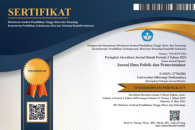RELASI KUASA DALAM KEPEMIMPINAN ADAT : Studi Relasi Kuasa dalam Model Kepemimpinan Adat di Kampung Kuta, Ciamis, Jawa Barat
Abstract
This paper is the theme of power relation in the model of Traditional Leadership in the village of Kuta, Ciamis West Java. This article tries to reveal how indegious leaders in the village of Kuta problems does play a political role in their leadership rolesrespectively. It is realize or not, each leader tried to strengthen his control over the roles and communication esthablisd between them. In addition, how these leaders scramble influence in the eyes of the people with legitimate power through what they call amandate ancestor. By using ethnographic qualitative research methods, the authorstied to describe as well as exploring the issues listed above. This is important because basically all the processes taking placein communications and community leaders is the knowledge that will be able answer the problems which appear above. Amanah ansector which they use as jargon to keep the power of a leader is basically something that is planned (by design) in the context of power relations that shaped their respective leaders.
Keywords
Full Text:
PDF (Bahasa Indonesia)References
Endraswara, Suwardi, 2008, Studi Etnografi dan Folklore, UGM Press, Yogyakarta.
Halpenny, P, 1984, Principle of Method, New York, Longman.
Harrison, Lissa, 2007, Metodologi Penelitian Politik (terj.), Cet I, Kencana Prenada, Jakarta.
Keesing, Roger M,1999. Antropologi Budaya, Suatu Perspektif Kontemporer Edisi Kedua, Erlangga, Jakarta.
Koentjaraningrat, 1997, Manusia dan Kebudayaan di Indonesia, Djambatan, Jakarta.
Marsh, David and Gerry Stoker, Theory and Methode in Political Science : Second Edition, Palgrave, Macmillan.
Makasim, Luthfi, 2007, Agama dan Budaya Politik, Sufisme dan Habitus Politik Masyarakat Banyumas, Swara Politika, Unsoed, Purwokerto.
Moleong, Lexi J, 1989, Metode Penelitian Kualitatif, PT Erlangga, Jakarta.
Muhadjir, Nung, 1998, Metode Penelitian Kualitatif, Edisis III, Penerbit Rake Sarakan, Jakarta.
Mulyana, Deddy. 2001. Metodologi Penelitian Kualitatif: Paradigma Baru IlmuKomunikasi dan Ilmu Sosial Lainnya, PT Remaja Rosdakarya, Bandung.
.
Shadilly, Hassan, 1984, Sosiologi untuk Masyarakat Indonesia, Ghalia Indonesia, Jakarta.
Spradley, James P. 1979, The Ethnographic Interview, Holt, Rinehart and Winston, New York.
Sumber lain
Apriansyah,2005, Budaya Politik Masyarakat Suku Samin, Skripsi Ilmu Politik FISIP Unsoed, Purwokerto.
Diu Oktora dalam http://diuoktora.blogspot.com/2009/12/adat-dan-demokrasi-di-desa-walait-papua.html).
Dokumen Konvensi ILO, di http://www.ilo.org/jakarta/whatwedo/publications/lang--en/contLang--id/docName--WCMS_141867/index.htm
Dokumen AMAN di http://aman.or.id/index.php?option=com_docman&Itemid=96
HidayatI, Nuri, 2008, Kontribusi Ustadz Bahrudin dalam Perkembangan Islam di Kampung Adat Kuta, Karapangpaningal, Ciamis, Jawa Barat (1981-1992), Skripsi Fakultas Adab, UIN Sunan Kalijaga, Yogyakarta.
Konvensi ILO mengenai Masyarakat Hukum Adat, 1989 (No.169): Sebuah Panduan, Kantor Perburuhan Internasional, 2003. Jenewa.
Peraturan Menteri Agraria/Kepala BPN No. 5 tahun 1999 tentang Masyarakat Hukum Adat.
Tantri, D, 2006, Kajian Budaya Politik Masyarakat Adat Baduy,Kanekes (Skripsi), Universitas Jenderal Soedirman, Purwokerto.
Tim Peneliti Jurusan Ilmu Politik Universitas Siliwangi (Kusmayadi Edi, dkk), 2009, Kajian Sosial, Budaya dan Politik Masyarakat Adat Kampung Kuta, LPPM Unsil, Tasikmalaya.
Tim Peneliti dari Disbudpar Jawa Barat, 1998, Tradisi Khas Kampung Kuta, Kabupaten Ciamis, Disbudpar Ciamis.
Wahid, Asep, 2001, Kajian Sosial Budaya Masyarakat Adat Kampung Naga (Skripsi), Universitas Jenderal Soedirman, Purwokerto.
DOI: https://doi.org/10.37058/jipp.v3i1.2654
Refbacks
- There are currently no refbacks.
Copyright (c) 2021 Subhan Agung
View My Stats











